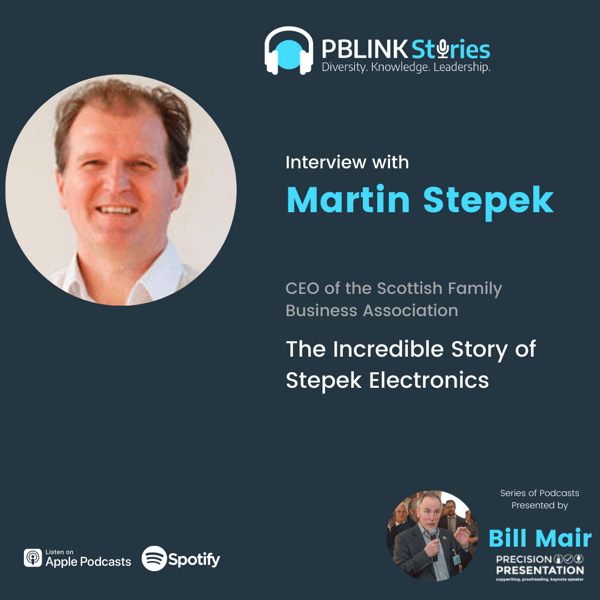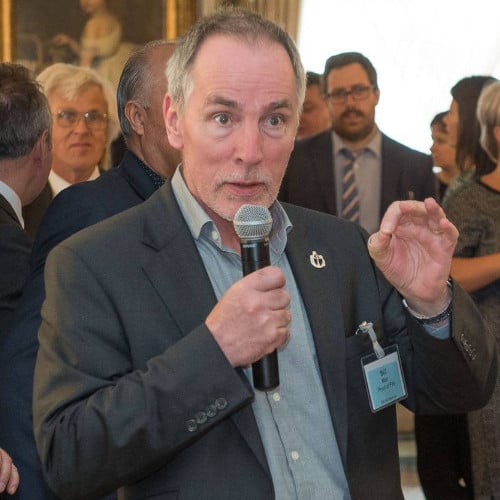Jan Stepek was the Polish entrepreneur, war hero and philanthropist who survived a Soviet gulag and built a multi-million-pound family business in the West of Scotland from literally nothing, only for it to come crashing down.
How did he achieve stellar success as an immigrant entrepreneur, who barely spoke English when he came to the UK? Jan was driven by the determination that his family would never suffer the fear, the disease, the poverty and starvation that he lived through before arriving in Scotland. He took every conceivable precaution against business failure. But the driving force behind his stellar business success was ultimately the reason for its eventual spectacular collapse.
Martin Stepek, CEO of the Scottish Family Business Association, spoke to Bill Mair of Precision Presentation about the harrowing and inspiring story of his father.
This story of heroism, selflessness and determination in overcoming unthinkable adversity has a lot to teach us about how to hold on to business success.
Starvation, Determination and Service
On the 10 February 1940, Jan Stepek, aged 17, was forced onto a cattle truck with his mother Janina and his two sisters and taken from his home in Maczkowce in SE Poland to a Soviet Gulag on the edge of the Arctic Circle. When Hitler attacked Russia 18 months later, they were released under an amnesty “although they had committed no crimes” and began an arduous trip, barefoot and starving, to modern-day Iran. When they arrived at the joint Soviet/British reception centre, Jan’s sister Danka weighed 25 kilos in her military uniform. She was 15 years old. Jan, aged 20, was able to hold his thigh in one hand, the thumb touching the finger.
After suffering typhus, malaria and dysentery (twice) in the Polish army while training in the Middle East, he decided that service on a ship in the Polish navy would offer more hygienic living conditions, so he signed up and was trained as a radar operator. He saw active service in the liberation of Sicily, Italy and the Dodecanese islands of Greece. Later, he was involved in the Normandy landings and in the North Sea landings in Germany.
After the war, it was impossible for Jan to return to Poland. His family home was now part of the Soviet Union and he risked imprisonment for having been in the Free Polish armed forces. He had lost his parents, his home and his homeland. Like many Polish people of his generation, he came to Britain to start a new life.

Starting Afresh Again
Jan had no more than his demob money in his pocket and very little English. Yet, he made his way to Glasgow, determined to gain qualifications and build a new life. He was forbidden to study his first choice of physics, as he had been in the Soviet Union for two and a half years, so he chose a course in electronics at the Royal College in Glasgow.
Soon, he was running a radio repair business from his tiny 2-room flat, now shared with his Scottish wife Teresa and three children. He gradually built his business and opened a shop in Cambuslang, near Glasgow, with Teresa managing the finances. He approached the electronics giant Philips, who had a factory in Hamilton and persuaded them to supply him with televisions but defer invoicing for 12 months while he rented them out. This was in 1955, at a time of great interest in television, following the televised coronation of Elizabeth II. Jan had great success and the business grew.
Business Growth
Jan was nervous. As an independent trader, he was vulnerable if a national retailer were to open up in one of the neighbouring towns. He started a process of opening shops in a spiral pattern in the towns surrounding his first shop.
When Martin was born, Jan had 5 shops open, making a decent income. But still the anxiety remained and he expanded his business empire, a town at a time.
To flatten the cash flow cycle throughout the year he diversified into travel, opening agencies to provide income during the summer months. Eventually, the company had 22 shops open, selling electrical appliances, travel, furniture, financial services and property.
Jan Stepek, the war hero who had survived starvation and suffered unimaginable horrors in WWII was now a millionaire. Martin talks about cringing with embarrassment when his father drove him and his siblings to school in one of the two Rolls Royces his father owned, alongside a sporty Triumph Stag.
Jan became known for his philanthropy and helped countless people who were down on their luck. He rescued Hamilton Academicals FC, not for any interest in football, but because he wanted to put something back into his adopted community. He was active in politics as an organizer of Solidarność in Scotland, helping to put an end to the communism in Poland that had oppressed his family. He opened up trade with Poland, importing Polish televisions and sent aid and medicine packages to Gdańsk in his company delivery vans.
Letting Go
Mindful that the whole point of the business had always been to provide for his family, Jan awarded shares in the company to each of his 10 children and their spouses. Some worked for the company, while others did not.
Jan retired officially and handed the reins to his children. He moved with Teresa to live in Florida for half of the year. But every time he came home, he couldn’t help but go back to the office and check how the business was doing. He would frequently rescind changes made by Martin’s eldest brother, John, now MD of the company, causing chaos.
Eventually, the family were able to tactfully ask Jan to leave the business to them, but their troubles were not over. Disagreements between shareholding siblings who worked in the company and those who did not and differences of opinion over the direction of the business did not contribute to a united vision and the company folded in 2002, having at one time employed 300 people.
Beware the Perils of Unprepared Success
Martin started the Scottish Family Business Association in 2005, with the aim of helping other families to avoid the pitfalls his family business had encountered.
Jan Stepek prepared for any and every external threat that could harm his business, in order to protect his family but it was family dynamics that eventually brought the business down from within.
Read an article about "The Secrets of Britain's Top Diverse Entrepreneurs" and find more about Martin Stepek and his father Jan Stepek, who came to the UK as a refugee and war hero after WW2
Martin was interviewed by Bill Mair of PrecisionPresentation.com for PBLINK Stories.
Listen to the podcast on Spotify or Apple: PBLINK Stories




Submit a Comment